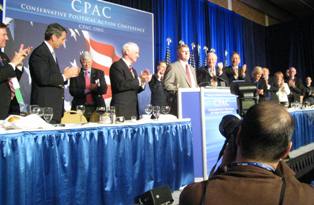Archives for March 2009
Nothing is creating more heat in the nation’s capitol than the battle over “The Employee Free Choice Act,” (EFCA) popularly known as “card check.”
This proposal has mass support from union leaders as it makes it easier to unionize workers. EFCA replaces the current system of a federally supervised secret ballot election with a card given to workers to opt-in for unionization. Critics are calling foul, as the proposal does away with a workers right to a secret ballot.
Today the Texas Senate had a hearing on Bill 690, which significantly increases the number of signatures needed to get an initiative on the local ballot and creates an unconstitutional hurdle to the process.
Critics of the legislations, rumored to have been requested by the Austin Chamber of Commerce, are worried that the new hurdles will restrict citizens from placing an item on the ballot by making it too hard and expensive for an average citizen. Local activists are worried that they, the “little guy” will become a non-entity if this legislation passes.
Denver’s KBDI Channel 12 today broadcasted an interview with Paul Jacob, President of Citizens in Charge Foundation, discussing the ballot initiative and referendum (I&R) process. Host Jon Caldera of the Independence Institute asked Jacob questions on reforming the I&R process, its affects on voters and public policy.
Oklahoma House Bill 2246, which would make several changes that would expand the state’s initiative process, passed the House today 90-4. SJR 13, an amendment to the state’s constitution, has passed the state Senate and will be coming up for a hearing in the House soon.
Today the U.S. Supreme Court refused to hear Arizona’s appeal on Brewer v Nader, (08-648).The high court has decided to let the decision stand nullifying the state residency requirement for petition circulators.
This case has a major impact for ballot initiative and referendum rights as well as third party candidates trying to get on the ballot.
Ballot Access News reported on the implications of the decision:
Tim Eyman, an activist in Washington State, just sent out an email announcing his legal victory of Initiative 960, requiring the state legislature to have a 2/3 majority vote in order to increase taxes. The Supreme Court unanimously rejected challenges to I-960.
Many times initiatives which have passed at the ballot box are challenged in the court system. In this case, Mr. Eyman won the challenge and the taxpayer protection initiative will stand. He writes:
Here are some pictures from last week’s Conservative Political Action Conference (CPAC).
As you know Paul Jacob, President of Citizens in Charge Foundation, was presented with the “Charlton Heston Courage Under Fire Award” from CPAC forhis commitment to citizen-led reform. CPAC highlighted his recent fight to uphold initiative rights in Oklahoma, where he had been indicted for helping citizens gather signatures for a state spending cap measure.
Citizens in Maine have united in protest against two unconstitutional bills currently moving through the Maine legislature that would severely limit their first amendment rights. Several grassroots activists and community organizers are calling on the legislature to act on LD 28 and LD 530 and protect Maine citizens
Citizens in Charge is calling on Virginia Governor Tim Kaine to sign HB 2465/ SB 1394 into law. HB 2465/SB 1394 would protect citizens who petition for removal of a public official from arbitrary sanctions and technical dismissals. The legislation is a response to the case of several Gloucester citizens who were fined $80,000 in legal fees after their attempt to remove several officials was thrown out on a technicality.
Last week Citizens In Charge Foundation asked citizens “Do you support the recent spending measures?” The poll was in response to the incredible amount of buzz created by CNBC’s Rick Santelli.
On national television the journalist stated “the government is promoting bad behavior” with the bailouts and proporosed a national referendum on the spending measures.
The results are quite astonishing. You can check them out here.
Â
Like other areas of American law, the regulations surrounding the ballot initiative process are heavily affected by court decisions. Oftentimes a regulation is listed in the initiative statutes, but it has been struck down or altered by a state or federal court. In the past courts have struck down bans on paying petition circulators, paying circulators by the signature, requiring circulators to be state residents, requiring signatures be gathered over a certain geographical area, and several other restrictions.